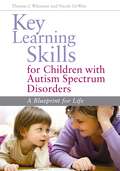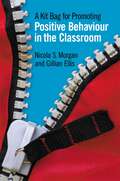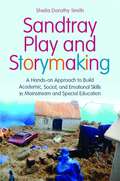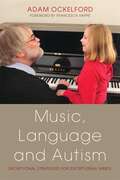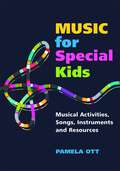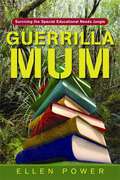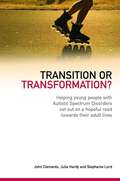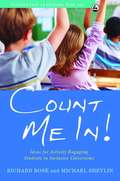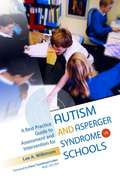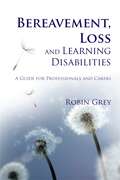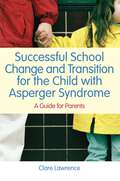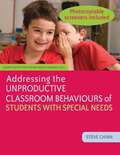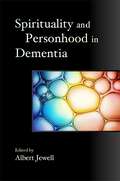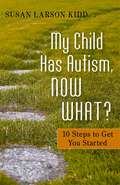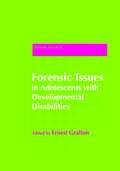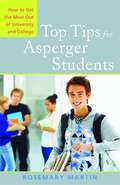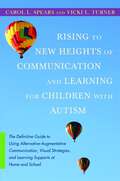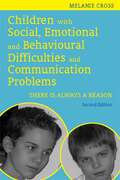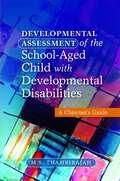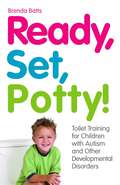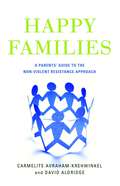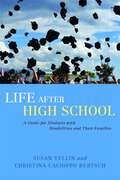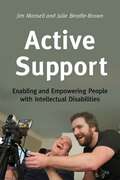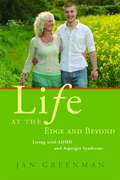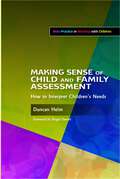- Table View
- List View
Key Learning Skills for Children with Autism Spectrum Disorders
by Nicole Dewitt Thomas L. Whitmanxx
A Kit Bag for Promoting Positive Behaviour in the Classroom
by Gillian Ellis Nicola S. MorganDisruptive classroom behaviours can prevent effective teaching and create a negative learning environment. This handy directory of behaviours has been written by teachers for teachers, and is bursting with tried and tested techniques to make the classroom a happier and more productive place for everyone. The 'Kit Bag' is a bank of up-to-date ideas that can be dipped into whenever needed, each one intended to get children focused and more engaged and excited by the learning process. The book suggests ways to create a positive learning environment in the classroom and encourages teachers to be proactive at the most vulnerable times of the school day such as at the start and end of lessons. Strategies are included for addressing behaviour hotspots, such as calling out, frequent crying or aggressive behaviour, as well as how to uncover the source of these problems and practical ways to prevent them from reoccurring. The useful Self-Assessment Checklist will also aid in making sure teachers are constructively reinforcing positive behaviour at all times. This widely acclaimed approach will be a must for any teacher who has ever been confronted with challenging behaviour and wants to get the best out of their pupils. It will also be a valuable tool for headteachers and senior leaders who want to revolutionise current school practices.
Sandtray Play and Storymaking
by Sheila Dorothy SmithIntroducing sandtray play and storying into mainstream and special education classrooms can have an extremely enriching impact on the learning experience. When used effectively, it can create the climate for social, emotional and behavioural growth and incite bursts of creativity in students. Build a world in your sandtray; tell its story; record it; listen to your partner's story - these are the invitations to students in a sandtray play/narrative workshop. The benefits of such an approach are endless, from the positive, therapeutic effects of physically displaying emotions through sand worlds to the development of essential speaking, listening and writing skills when telling and recording sand world stories. This accessible and classroom-friendly book explains the thinking behind this unique approach and answers all the nuts-and-bolts questions of sandtray/narrative workshop setup. It offers a wealth of practical methods that can be applied to a wide spectrum of the student population and details real-life anecdotes and student work. This book is an invaluable handbook for teachers and school counselors looking to use play and storying as a way to develop core competencies in children with special educational needs and in the mainstream, and will also be of interest to play therapists, speech and language therapists and educational psychologists.
Guerrilla Mum
by Ellen PowerGetting the educational provision you need for your special needs child can feel like an uphill struggle. This book offers clear guidance on how authorities such as Local Education Authorities, schools, the National Health Service and the Government function, what the law entitles your child to, and how you can fight most effectively for the education they need. Basing the book on her own experience of bringing up two sons with special educational needs, Ellen Power describes how she worked with - and in some cases challenged - the authorities to get the right education for her children. Outlining what she did, how she did it, and how you can do the same, she explains clearly the implications of the Special Educational Needs code of practice and the Disability Discrimination Act, as well as giving advice on diagnosis, assessment, and dealing with the authorities. Further sections look at how to address issues such as transition between schools, and bullying. Interweaving real-life experience with practical advice, Guerrilla Mum is essential reading for parents of children with special educational needs and disabilities.
Transition or Transformation?
by Stephanie Lord Julia Hardy John ClementsYoung people with Autism Spectrum Disorders (ASDs) can often find the step into adulthood and independence more difficult than their neurotypical peers, particularly where employment is concerned. The authors show, however, that with the right guidance and a positive attitude in schools, young people with ASDs can be every bit as happy and successful as those who are not on the spectrum. The book describes a programme developed over a number of years by teachers at a school for young people with ASDs, which successfully enabled autistic pupils to achieve their full potential. The authors explain in detail the challenges faced by the young people at the school, and show how, encouraged by a culture of optimism and hopefulness, the programme developed their confidence and skills, with the result that many of them are now in employment. The book also provides an in-depth exploration of a multitude of styles and techniques for building relationships. Concluding with a reflection on leadership and organisational culture, the authors demonstrate that if the approach is adopted by an entire school and not just a handful of teachers, it really can work. This inspiring and innovative book will be a must for educators at every level, psychologists, academics, and anybody else interested in a positive educational approach that will enable young people with ASDs to get the most out of life.
A Best Practice Guide to Assessment and Intervention for Autism and Asperger Syndrome in Schools
by Lee A. Wilkinson*Winner in the Education/Academic category of the 2011 Next Generation Indie Book Awards**Shortlisted for the 2011 NASEN Award 'The Special Needs Academic Book'*With a focus on best practice and the importance of early diagnosis, this book provides a practical and scientifically-based approach to the assessment and diagnosis of Asperger Syndrome and autism spectrum conditions. This book offers a balance of conceptual, practical and empirical information designed to bridge the research-to-practice gap in identifying, assessing, and treating school-aged children with autism-related conditions. Assessment tools and intervention strategies will support school-based professionals in:· identifying and assessing young people with high-functioning autism spectrum conditions· developing and implementing classroom-based intervention programs· initiating a dialogue between parents and teachers· accessing community resources· promoting special needs advocacy. With illustrative case studies, FAQs, quick reference boxes, and a glossary, this accessible guide will appeal to teachers, counsellors, psychologists, social work practitioners and students.
Bereavement, Loss and Learning Disabilities
by Robin GreyLosing a loved one and coping with the subsequent adjustments that follow are a difficult fact of life, but people with learning disabilities face specific difficulties in processing and managing these changes. Adopting an integrative approach, this book acknowledges the importance of helping relationships in supporting this vulnerable group through periods of loss and bereavement. The author explains how to engage the person with a learning disability in talking therapy by creating an open dialogue. Common signs of stress, factors to consider in assessing risk and advice on how best to approach difficult subjects are presented. The role of supervision in counselling and issues surrounding terminal illness are also discussed, and practical solutions offered. Professionals working in the field of learning disabilities, such as counsellors, therapists, carers and health and social care students will find this informed guide beneficial in communicating and supporting people with learning disabilities.
Successful School Change and Transition for the Child with Asperger Syndrome
by Clare LawrenceMoving to a new school can be a daunting prospect for the child with Asperger syndrome, and parents are often left feeling powerless to help prevent the anxiety and loss of confidence which may ensue. Clare Lawrence's new book provides parents of children with Asperger syndrome with practical advice on how to prepare their child for moving to a new school, and how to help make the transition as smooth as possible. A wide range of material is covered, including useful guidance on choosing the right school, supporting the child during the period prior to the move, and identifying and practising the different social rules and expectations of the new school. The strategies in the book can be adapted for children of all ages and include working out a transition time-line, identifying a named adult and 'safe haven' at the school, and effective communication between parents, teachers and support staff. This clear and accessible book will be an invaluable resource for parents of children with AS who are moving to a new school, and will also be of interest to the teachers and education professionals who work with them.
Addressing the Unproductive Classroom Behaviours of Students with Special Needs
by Steve Chinn*Shortlisted for the 2011 NASEN Award 'Book to Promote Professional Development'*Certain classroom behaviours can signify an underlying learning disability. This book will help you recognise potential indicators of Asperger Syndrome, dyslexia, dyspraxia, AD/HD, physical disabilities and speech and language disorders; explores the benefits of different interventions; and offers practical strategies for improving pupils' behaviours, social skills and self-esteem. This book contains:- A simple-to-use screener for initial identification of a pupil's specific learning disability- A practical and simple structure for monitoring classroom behaviours and creating an Individual Behaviour Plan- Tried-and-tested teacher strategies for common areas of concern, such as problems staying on task, inability to work on group tasks and failure to seek help when needed- Key educational theories to help teachers understand and influence classroom behaviours, and further develop classroom management skills for addressing the behaviours of special needs pupils. This practical, accessible book is an essential tool kit for special educational needs coordinators, learning support staff and teachers in both primary and secondary schools.
Forensic Issues in Adolescents with Developmental Disabilities
by Ernest GraltonAdolescents with developmental disabilities are a complex population who require specialised treatment and care. This interdisciplinary text examines the processes involved in working with this client group in forensic settings, and explores the ways in which their needs differ from those of other young people who engage in high risk behaviour or offending. The book covers assessment, intervention and treatment options for adolescents with a wide range of developmental disabilities, including autism spectrum disorders, acquired brain injury, developmental traumatology, and complex comorbidities. It describes the obstacles, challenges and opportunities to consider when working with this population, and the role played by various professionals, including forensic psychiatry and psychology, occupational therapy, physiotherapy, education, art psychotherapy and social work. The book also outlines the issues to consider when working in secure and community settings as well as the legal aspects of working with this client group, and the complex issues surrounding risk assessment. The first comprehensive account of forensic issues in adolescents with developmental disabilities, this book will be an indispensible primary resource for a wide range of professionals, including child and adolescent psychiatrists, community psychiatric nurses, developmental paediatricians, social workers and youth workers, lawyers and advocates.
Top Tips for Asperger Students
by Rosemary MartinLeaving home and moving to college or university can be a daunting experience. In this easy-to-use book, Rosemary Martin provides guidelines and invaluable advice for every student on the Autism Spectrum as he or she thinks about, and plans for, entry into student life. Packed with tried and tested methods for coping and succeeding away from home that cover every aspect of student life, this book focuses on the particular needs of people with AS - from how to get up on time for lectures, to the art of living with other people and attending to the basics of personal hygiene - and encourages everyone to make the most of student life in a style that suits them. Handy hints and tips reassure the reader that going to college is a big deal for every student, regardless of whether or not they are on the autism spectrum. This friendly and useful book is an absolute must for any student on the spectrum about to begin a university or college degree.
Rising to New Heights of Communication and Learning for Children with Autism
by Vicki L. Turner Carol L. SpearsChildren with pervasive developmental disorders often do not learn from conventional methods, which can result in social isolation, behavior problems, limitations in communication, and slow academic growth. Greater integration into home and school activities, improved behavior and academic success can be achieved using alternative-augmentative communication (AAC), and this book explains exactly how to make it happen. Exploring the various communication and intervention options available and offering straightforward techniques and strategies for using them effectively, this book clearly explains everything families, teachers, therapists and other professionals need to know in order to improve a child's communication, behavior, social and academic skills. Chapters follow a consistent, user-friendly format, answering the questions Who, What, Why, How, Where and When about every technique. This book will be essential reading for anyone looking to improve social interaction between children with pervasive developmental disorders and those around them.
Children with Social, Emotional and Behavioural Difficulties and Communication Problems
by Melanie CrossChildren and young people with social, emotional and behavioural difficulties (SEBD) are far more likely to have communication problems than their peers, yet these problems are under-recognised, under-researched, and most importantly, often unaddressed. Melanie Cross considers the reasons why behavioural and communication difficulties so often occur together, and examines the social, educational and mental health implications of this. She shows that improving the communication skills of children and young people with SEBD can contribute to better outcomes, and that speech and language therapy is an important, yet often absent, service for this group. She provides practical guidelines for assessing communication, as well as useful strategies to help children and young people with SEBD to develop their communication skills. This second edition also contains information on unidentified and unmet communication needs in vulnerable young people, including young offenders and those at risk of social exclusion. This book will be an invaluable resource for speech and language therapists, social workers, teachers and other professionals working with children with emotional, behavioural and communication difficulties.
Developmental Assessment of the School-Aged Child with Developmental Disabilities
by M. S. ThambirajahChildren and adolescents with emotional and behavioural problems who are referred to mental health services for assessment often have undiagnosed mild learning disabilities, and this guide is written for clinicians involved in making such assessments. It provides full guidance on common developmental disorders and their assessment, focusing on mild to moderate disabilities in the school-aged child. It covers intellectual disabilities, dyslexia, dyscalculia (mathematical disability), autism spectrum disorders, speech and language impairment, developmental coordination disorder, and emotional and personality development. Each chapter includes an account of normal development, including developmental milestones, an overview of the disorder, and its clinical assessment. This important professional guide will be invaluable for all child health and mental health professionals and trainees, including paediatricians, psychiatrists, mental health workers, clinical psychologists and educational psychologists.
Ready, Set, Potty!
by Brenda BattsPotty training a child with developmental disorders can be a real challenge, and sometimes the extra difficulties make you feel as though you've tried everything, and failed. In this book, Brenda Batts shows how you can overcome problems, big and small, and provides tried and tested methods that really work, tailored to each individual child. Bursting with ideas on how to see past conventional strategies and adapt toilet training to suit your child, this book outlines methods that have helped even the most despairing of parents and caregivers. Examples of success stories range from two-year-olds to adults aged 20, and show that no matter how difficult it may seem, a little creativity and adaptation can get anyone toilet trained, however many previous attempts have failed. The program itself is supported by plenty of helpful hints and tips, as Brenda covers all you need to get your child past the diaper stage and help them to achieve a big step towards independence. This book is a must for anybody looking to toilet train someone with developmental disorders.
Happy Families
by David Aldridge Carmelite Avraham-KrehwinkelParenting a severely disruptive child can be exhausting and demoralizing to the point where breaking the cycle of bad behaviour seems an impossible task. Happy Families offers a realistic, step-by-step, practical approach to tackling destructive behaviour that helps parents regain control and establish harmony within the family. Using hands-on techniques based on the principles of non-violent resistance, each chapter deals with a different stage of the process - from communicating to the child an unwavering determination that the situation will change and enlisting the support of family and friends, to taking positive action in a way that avoids escalation. General advice such as how to respond constructively and consistently to provocation is included throughout, and morale-boosting tips encourage flagging parents to persevere with the approach. Happy Families will empower despairing parents and caregivers who seek to contain, counter and positively re-direct the aggression they face from children in distress, resulting in deep-felt and lasting change.
Life After High School: A Guide for Students with Disabilities and Their Families
by Christina Cacioppo Bertsch Susan Yellin*Bronze Medal Winner in the Education / Academic / Teaching Category of the 2011 IPPY Awards** Bronze Medal Winner in the 2010 BOTYA Awards Education Category *Graduating high school and moving on to further education or the workplace brings with it a whole new set of challenges, and this is especially true for students with disabilities. This useful book provides a complete overview of the issues such students and their families will need to consider, and outlines the key skills they will need in order to succeed once they get there. The authors describe the legal landscape as it applies to students with disabilities in the USA, and how to obtain the proper disability documentation to ensure that the student receives the right support and accommodations in college. Focusing specifically on the issues that affect students with disabilities, they offer advice on everything from dealing with college entrance exams and the college application process, to selecting the right college, visiting the campus, and achieving medical and financial independence away from home. A list of further resources guides students and their families towards additional sources of information and support, and stories of students with disabilities who have made the transition from high school to further education or the workplace are included throughout. This accessible and thoroughly readable book offers help and support to students with disabilities of all kinds, and their families, both before and during the transition to life after high school.
Active Support
by Julie Beadle-Brown Jim MansellActive Support is a proven model of care that enables and empowers people with intellectual disabilities to participate fully in all aspects of their lives. This evidence-based approach is particularly effective for working with people with more severe disabilities, and is of growing interest to those responsible for providing support and services. The authors provide a comprehensive overview of Active Support and how it can be used in practice, based on the theory and research underpinning the methods involved. They describe how to engage people with intellectual disabilities in meaningful activity as active participants, and look at the communication style needed to foster positive relationships between carers and the people they are supporting. Highlighting the main issues for those trying to put Active Support into practice, they explain what is needed on a day-to-day basis to support the implementation, improvement and maintenance of the approach, along with possible solutions for the difficulties they may encounter. Finally, they look at how to integrate Active Support with other person-centred approaches, drawing on examples from various organisations and individual case studies. The definitive text on Active Support, this book will be essential reading for anyone professionally concerned with the quality of life of people with intellectual disabilities, including psychologists, behaviour specialists, social workers, care managers, occupational therapists and inspectors and regulators of services, as well as families.
Life at the Edge and Beyond
by Jan GreenmanParenting a child with Asperger's syndrome is never easy, and adding ADHD to the psychological mix makes life even more difficult. In this searingly honest account of bringing up her son, Luke, Jan Greenman challenges common perceptions of a 'life with labels', and recalls her family's 18 year journey to the edge and back. Writing frankly about the medical issues of Luke's early years, including the impact of MMR and Ritalin, Jan recalls how Luke's diagnoses came about, and how life at The Edge, their aptly named family home, changed as a result. She describes the causes and effects of the behaviours associated with Luke's conditions, and the impact they had on each family member, including his younger sister, Abbi. The only predictable thing about Luke is his unpredictability, and Jan also takes a light-hearted look at some of his more unusual habits and obsessions. The book includes tips and advice from Jan, Abbi, and Luke himself, and the final chapters go beyond Luke's early years to look at his life as a teenager - his solo trip to Dubai, and subsequent encounter with customs, his expulsion from school, and the inspirational Headteacher who helped him to turn his life around. Life at the Edge and Beyond is a must for anyone involved in bringing up a child with Asperger's syndrome, ADHD - or both. Parents will take from the family's successes, learn from their mistakes, and realize that, no matter how close to the edge they may feel, they are never alone.
Making Sense of Child and Family Assessment
by Duncan HelmThe application of assessment frameworks hinges on human qualities and skills which are naturally prone to bias and inconsistency. Making Sense of Child and Family Assessment aims to support workers in analysing and making sense of the information gathered, and increasing accuracy and empathy in assessing the needs and risks for vulnerable children and young people. This book offers best practice guidance on how to analyse information gathered during the assessment of children and young people and their families. Good assessments take time and need to be appropriately resourced. A range of analytical tools are also needed if practitioners are to present assessments of children's needs which lead to meaningful care plans and improved outcomes. Helm introduces the key messages emerging from policy and research, and provides insights into today's multi-disciplinary practice. Professionals working in child welfare and protection roles, such as social workers, health visitors, midwives and teachers will find this practical guide to analysis invaluable in interpreting needs and outcomes.
